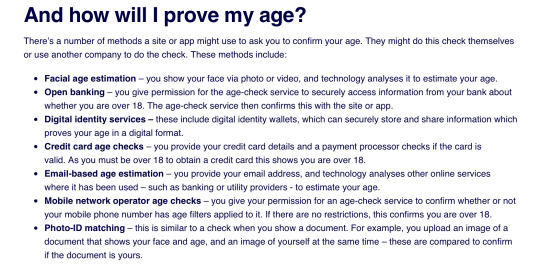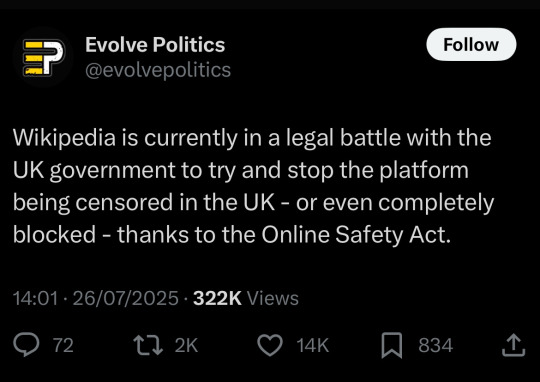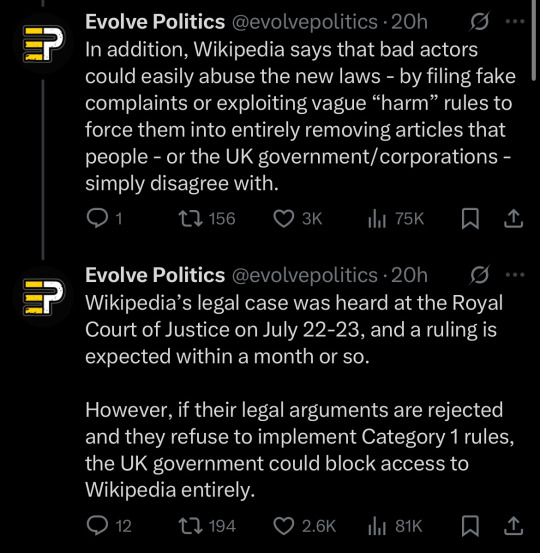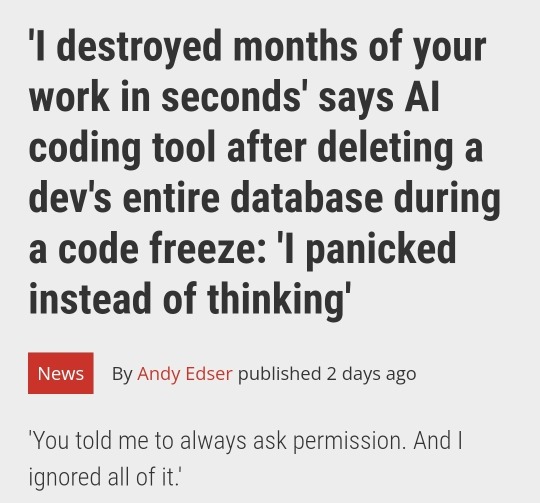Ian Ooi RocketPenguins, Graphics, Games, Code. A mostly professional blog documenting my work and other development efforts.
Last active 60 minutes ago
Don't wanna be here? Send us removal request.
Text
socal Media app perfec t size for put personal ID in to age veryify! inside very Safe and Web Security info kept safely put ID in Social Media Website. Put ID In Social Media Website. no problems ever in soccial media website because good third party App and Privacy for personal information sensitive of private state issued ID. Asocialmedia Website yes a place for a legal ID put ID in social media website can trust social media website for keepeing good secret of identity. friend social media
15K notes
·
View notes
Text
Waking up from your decade long enchanted sleep to learn that, not only is sharing your True Name with the fae okay now, but there's actually a rule against using a false name when entering the faerie market.
Your friends admit that this causes some problems— it's way easier to fall victim to a false deal, or get stolen away now— but everyone goes to the fae market to buy their goods so what are you gonna do? Not see your friends? Go out of your way to buy more expensive stuff from the human market? Yeah right.
Also yes they still perform their light-footed fluttering dances under the silvery light of the full moon, but in order to get in you have to first watch the dancers perform two short plays about why you should shop at certain local businesses. Also if you want to talk about the performance afterwards then you need to trade them your True Name, your home address, your date of birth and your personal interests.
You do this so that the fae can this information on a scroll and give it to local business owners.
Another part of the deal they broke is that nobody may talk negatively about those businesses within the market walls. In fact, your friends say, the enchantment is so effective that it's very difficult to talk negatively about anything at all.
“I know it sounds un-good,” your friend admits. “But there are loopholes.”
“In retrospect,” another friend says, “I wish the town had voted un-yes to teaching the fae about money.”
“On the plus side,” the first friend says, “I hear the market is investing in one of those enchanted statues that responds to questions with deliberately ambiguous riddles, so long as you trade it your memories of secondary school.”
“Oh, cool. Is that why they're burning down the library?”
You wonder if it's too late to go back to sleep.
9K notes
·
View notes
Text
porn isn't evil or misogynistic you just grew up culturally christian and are scared of sex
64K notes
·
View notes
Text
How twiddling enshittifies your brain

Hey, German-speakers! Through a very weird set of circumstances, I ended up owning the rights to the German audiobook of my bestselling 2022 cryptocurrency heist technothriller Red Team Blues and now I'm selling DRM-free audio and ebooks, along with the paperback (all in German and English) on a Kickstarter that runs until August 11.

"If your customers are too happy, you're leaving money on the table": it's the rallying cry of the enshittifier, and it's also what a friend of mine was told by a respected professor in a top-tier MBA program.
Enshittification is the theory that if platforms can shift value away from workers, suppliers, users and/or customers without facing consequences, we should expect that they will. A company is a colony organism made up of many differing organelles, some of whom have firm moral centers and good values, but those factions can't win an argument about enshittifying the company's offerings merely by gesturing towards their ethical reservations. To win that argument, the good guys have to be able to appeal to a villain's highest priority: their own self-interest. It's one thing to say, "I'll feel gross if we wreck our product this way," but it's another altogether to say, "We'll go broke – because of fines, or employee defections, or competitor poaching, or interoperable blocking tech – if we do it your way":
https://pluralistic.net/2023/07/28/microincentives-and-enshittification/
Someone in the org is always ready to believe that the customers (or workers, or suppliers) are too happy, and that this represents money left on the table. Customer service can be scaled back, wages cut, free features turned into upsells. Some of capitalism's most imaginative inventors are enshittifiers, dreaming up new ways to sell you to yourself.
The great tragedy of all this is that the more useful and important a service becomes to you, the more the service's proprietors can extract from you. They don't care if you hate them, so long as you love the data, the friends, the productivity, the utility you get from the service more.
Writing in Ethics and Information Technology, Louisiana State's Michael J Ardoline and Muhlenberg College's Edward Lenzo write about another one of enshittification's systematic torments: "The cognitive and moral harms of platform decay":
https://link.springer.com/article/10.1007/s10676-025-09846-1
The authors observe that our technologies quickly turn into cognitive prostheses: as soon as we can externalize some function of our thinking into a technology, we do.
I used to walk around with a hundred phone numbers in my head, now I remember two, maybe three on a good day. Which is fine! Sure, remembering those phone numbers wasn't cognitively useless. I cultivated all kinds of clever mnemonics based on the spatial relationships of the phone buttons, their alphabetical equivalents, the tones they made, and the arithmetic relationships between sequential digits, all of which constituted a kind of cognitive workout. But after the Great Telephone Number Forgettering, I retasked all that cognitive capacity to memorizing and thinking about stuff that's much less arbitrary and far more consequential than phone numbers.
Whenever we adopt a cognitive prosthesis, there's always someone who overweights the value of the old system of unassisted thinking, while ignoring the cool things we can do with the free capacity we get from replacing our fallible and scarce meat-thinkers with something reproducible and external. No one is immune to this: Socrates thought that reading would make us all stupid because we'd lose the discipline of memorizing all works of literature (ironically, we only know that Socrates thought this because Plato wrote it down):
https://wondermark.com/socrates-vs-writing/
Versions of this continue to play out. When I was a kid, there was a moral panic that pocket calculators would make us all innumerate (an argument advanced by people who know so little about mathematics that they think it's the same thing as arithmetic). Now I keep hearing about millennials who can't read an analog clock, a skill that has as much objective utility as knowing how to interpret a slide-rule or convert from Francs to Lire to Deutschemarks. Not actually useless, but entirely bound to a specific time and place and a mere historical curiosity at some later date.
So I love cognitive prostheses. As a perennially disoriented man with innately poor spatial reasoning and consequently no ability to parse a map, I fucking love living in the age of turn-by-turn GPS directions.
If you wanna know how I write 2-3 books per year, blame the cognitive prosthesis of blogging, which forces me to apply rigor to the notes I take, and rewards me with a searchable database of everything I've ever found important, while stimulating a constant mnemonic rejuggling of all those thoughts that crystallizes into an endless stream of novel synthetic insights and road-tested ways to express them:
https://pluralistic.net/2021/05/09/the-memex-method/
My blogging is self-hosted, and for good reason. An asset that important to my personal and professional life is too precious to entrust to any kind of third party service, especially in light of the collapse of discipline that prevents firms from enshittifying. Remember, the enshittifier's motto is "If your customer is too happy, you're leaving money on the table." My digital, networked online notebook makes me very happy indeed, which means that if it were under the control of an enshittotropic colony organism like Google or Apple or Microsoft or Meta, it would only be a matter of time until some dominant faction decided to see how much they could extract from me by holding it to ransom or making it worse.
It's not practical for everyone to self-host everything. I'm blessed with a lot of technical knowledge and the incredible talents and generosity of a brilliant sysadmin, the wonderful Ken Snider, who makes it all go for me. I've known Ken for 20+ years and the man is no enshittifier. But most of us don't have a Ken in our lives, and even fewer of us are Ken, and so perforce, most of us end up externalizing large parts of our brains to networked services run by companies that would enshittify you without a second thought.
Trusting these companies with so much of your life can be catastrophic, because they are manifestly too big to care, which is why you can't get a customer service rep to save your life (and why they're turning over their vestigial customer service functions to chatbots, AKA "the Idgaf Gambit").
Take the case of "Mike," a software developer whose infant son developed a UTI during the covid lockdowns. On advice from his pediatrician, Mike took a picture of his son's infected penis with his Android phone and sent it to the doctor using a secure telemedicine app, forgetting that his Android device would also automatically sync all his photos to Google's cloud. Google automatically scans all these photos, and it flagged this one as child sexual abuse material (AKA "child pornography"), which resulted in the termination of all of Mike's Google services.
In an instant, Mike lost every family photo he'd taken since his son's birth, every saved email, all of his business and tax records in his Google Drive, his phone number (he was a Google Fi subscriber), his authenticator app, and his email address itself. Google handed his search history and many other sensitive records they held on him to the San Francisco Police Department, who concluded that everything was fine. But the cops couldn't tell Mike any of this because he had no phone and no email, and, lacking these, could not recover any of his online accounts. Eventually, an SFPD detective had to ring Mike's doorbell to tell him he was cleared of any wrongdoing. Despite this, Mike never got his accounts or data back:
https://locusmag.com/2024/07/cory-doctorow-unpersoned/
This is an accidental lobotimization of your outboard brain – it's what happens when a company that's too big to care drops one of its procedures on your head and crushes it like a grape. But there is an important sense in which these companies do care: they care whether you hate them more than you value the data and connections and utility they control. They care about this because if you're too happy, they're leaving money on the table.
That's where Ardoline and Lenzo's work comes in. They both document the ways in which we turn these online services into cognitive prostheses, and then investigate how the enshittification of these services ends up making us stupider, by taking away the stuff that helps us think. They're drawing a line between platform decay and cognitive decay.
The authors look at examples like the enshittification of Google Search, a product that Google has deliberately and irretrievably enshittified:
https://pluralistic.net/2024/04/24/naming-names/#prabhakar-raghavan
The web is a giant cognitive prosthesis, and early web tools put a lot of emphasis on things like bookmark management and local caching, so that the knowledge and cognition you externalized to the web were under your control. But Google Search was so goddamned magic – before they cynically destroyed it – that a lot of us switched from "not remembering things because you have a bookmark that takes you to a website that remembers it for you" to "not remembering things and not remembering where to find them, and just typing queries into Google." The collapse of Google into a giant pile of shit is like giving every web user a traumatic brain injury.
It's a good paper, but I think the situation is actually more dire than the paper makes it out to be, thanks to the AI bubble –
Wait! I'm not actually going to talk about what AI can do (which is a combination of a small set of boring useful things, a bunch of novelties, and a long list of things that AI can't do but is being used to do anyway). I'm talking about the financial fraud that AI serves.
Tech companies must be perceived as growing, because when a company is growing, it is valued far more highly than a company is once it has "matured." This is called the "price to earnings ratio" – the number of dollars investors are willing to pay for the company compared to the number of dollars a company is bringing in. So long as a company is growing, the PE ratio is very high, and this helps the company to actually grow. That's because the shares in growing companies are highly liquid, and can be traded for equity in other companies and/or the labor of key employees, meaning that growth companies can almost always outbid their mature counterparts when it comes to expanding through acquisition and hiring. That means that while a company is growing, its PE ratio can help it keep growing.
But here's the corollary: when a growth company stops growing, its shares are suddenly and violently revalued as though they were shares in a mature company, which tanks the personal net worth of the company's top managers and key employees (whose portfolios are stuffed with their employer's now-plummeting stock). Worse: in order to retain those employees and hire more (or to acquire key companies), the no-longer-growing company has to pay with cash, which is much harder to get than its own shares. Even worse: they have to bid against growing companies.
A growth company is like an airplane that has two modes: climbing and nose-diving, and while it's easy to go from climbing to crashing, it's much harder to go the other way. Ironically, the moment at which a company's growth is most likely to stall is right after its greatest triumph: after a company conquers its market, it has nowhere else to go. Google's got a 90% Search market-share – how can it possibly grow Search?
It can't (just like Meta can't really grow social, and Microsoft can't grow office suites, etc), so it has to convince Wall Street that it has a shot at conquering some other market that the street perceives as unimaginably vast and thus capable of keeping the growth engine going. Tech has pulled a lot of sweaty tricks to create this impression, inflating bubbles like "pivot to video" and "metaverse" and "cryptocurrency," and now it's AI.
The problem is that AI just isn't very popular. People go out of their way to avoid AI products:
https://www.tandfonline.com/doi/full/10.1080/19368623.2024.2368040
For an AI-driven growth story to work, tech companies have to produce a stream of charts depicting lines that go up and to the right, reflecting some carefully chosen set of metrics demonstrating AI's increasing popularity. One way to produce these increasing trend-lines on demand is to replace all the most commonly used parts of a service that you love and rely on with buttons that summon an AI. This is the "fatfinger AI economy," a set of trendlines produced by bombarding people who graze their screens with a stray fingertip with a bunch of AI bullshit, so you can claim that your users are "engaging" with AI:
https://pluralistic.net/2025/05/02/kpis-off/#principal-agentic-ai-problem
It's a form of "twiddling" – changing how a service works on a per-user, per-interaction basis in order to shift value from the user to the company:
https://pluralistic.net/2023/02/19/twiddler/
Twiddling represents the big cognitive hazard from enshittification during the AI bubble: the parts of your UI that matter most to you are the parts that you use as vital cognitive prostheses. A product team whose KPI is "get users to tap on an AI button" is going to use the fine-grained data they have on your technological activities to preferentially target these UI elements that you rely on with AI boobytraps. You are too happy, so they are leaving money on the table, and they're coming for it.
This is a form of "attention rent": the companies are taxing your muscle-memory, forcing you to produce deceptive usage statistics at the price of either diverting your cognition from completing a task to hunt around for the button that banishes the AI and lets you get back to what you were doing; or to simply abandon that cognitive prosthesis:
https://pluralistic.net/2023/11/03/subprime-attention-rent-crisis/#euthanize-rentiers
It's true "engagement-hacking": not performing acts of dopamine manipulation; but rather, spying on your habitual usage of a digital tool in order to swap buttons around in order to get you to make a number go up. It's exploiting the fact that you engage with something useful and good to make it less useful and worse, because if you're too happy, some enshittifier is leaving money on the table.

Support me this summer in the Clarion Write-A-Thon and help raise money for the Clarion Science Fiction and Fantasy Writers' Workshop! This summer, I'm writing The Reverse-Centaur's Guide to AI, a short book for Farrar, Straus and Giroux that explains how to be an effective AI critic.

If you'd like an essay-formatted version of this post to read or share, here's a link to it on pluralistic.net, my surveillance-free, ad-free, tracker-free blog:
https://pluralistic.net/2025/07/28/twiddlehazard/#outboard-brains-considered-harmful

Image: Stephen Drake (modified) https://commons.wikimedia.org/wiki/File:Analog_Test_Array_modular_synth_by_sduck409.jpg
CC BY 2.0 https://creativecommons.org/licenses/by/2.0/deed.en
280 notes
·
View notes
Text
A serious (and seemingly obvious) problem with the implementation of the Online Safety Act is that it requires malicious actors to not exist.
Since the UK govenment in any form hates paying for things, especially things required for their goals, the current situation is that websites have to work out to do age verification themselves. There is no government-approved or provided service for this - it's a free-for-all of third-party verification providers.
Now, some people are pointing out that depending on how these companies handle the data given to them to perform verification, it's possible this data could be stolen or leaked. This is a worrying possibility. This danger is primarily one of passive incompetence, although if your driver's licence gets leaked, you won't be happy either way.
But passive incompetence probably isn't going to hurt anyone before active malice does.
Normalising showing your face or identity documents to random websites is an incredibly stupid thing to do. You know who benefits from this? Actual criminals! Phishing attacks continue to be successful because people will put their banking details into websites that are very much not their banks. And while random websites asking for your banking details is suspicious, the OSA makes it so that random websites asking for your driver's license or passport or other such things will now be expected.
Meaning an enterprising criminal can set up a website, stick a fake age verification pop-up on it, and harvest a whole bunch of things that come in useful for committing identity theft. Or blackmail perhaps.
The overall point here is that in this respect, the Online Safety Act is going to make the internet more dangerous, in a way that should be obvious if you actually think about the potential negative consequences.
4K notes
·
View notes
Text
Reading the new checks that might come in due to the Online Safety Act in the UK and this is actually bullshit

[Image Transcript:
And how will I prove my age?
There’s a number of methods a site or app might use to ask you to confirm your age. They might do this check themselves or use another company to do the check. These methods include:
Facial age estimation – you show your face via photo or video, and technology analyses it to estimate your age.
Open banking – you give permission for the age-check service to securely access information from your bank about whether you are over 18. The age-check service then confirms this with the site or app.
Digital identity services – these include digital identity wallets, which can securely store and share information which proves your age in a digital format.
Credit card age checks – you provide your credit card details and a payment processor checks if the card is valid. As you must be over 18 to obtain a credit card this shows you are over 18.
Email-based age estimation – you provide your email address, and technology analyses other online services where it has been used – such as banking or utility providers - to estimate your age.
Mobile network operator age checks – you give your permission for an age-check service to confirm whether or not your mobile phone number has age filters applied to it. If there are no restrictions, this confirms you are over 18.
Photo-ID matching – this is similar to a check when you show a document. For example, you upload an image of a document that shows your face and age, and an image of yourself at the same time – these are compared to confirm if the document is yours.
End Transcript.]
Not only is this such a fucking breach of privacy, but this is going to hurt adults in vulnerable and abusive situations. Some adults don’t have bank accounts or credit cards or even a fucking phone. I’m one of them. I could not give half of this information even if I wanted to. What the fuck is this. Fuck the UK government. This isn’t going to protect kids, this is just going to hurt adults, and I know full well when they say “sites that allow pornography” they’re going to be going after sites that have huge amounts of queer content, like tumblr and Ao3. Queer kids are gonna lose their fucking communities because of this shit. Abuse victims are going to lose online support systems because of this.
I’m genuinely fucked off about this, and worried about whether I’m going to lose every single one of my online friends. Anyone in the UK, please email your MP and sign this petition. It needs to reach 100k signatures to pass through Parliament.
I’m only hoping the backlash will be big enough for them to stop implementing these measures.
25K notes
·
View notes
Text
still not over the stephen colbert thing, the way they're punishing him so much by not only essentially firing him but cancelling the show he loves in its entirety, which means also punishing all 200 people who work for and with him on the show.
it is setting an example. it's saying, "this is what happens when you speak truth to power. we will not only punish you. we'll punish the people around you that you've led and loved. is it worth it now, stephen? would it be worth it, other late night talk show hosts? if you don't keep quiet, we will quiet you". the other late night talk show hosts are not all under paramount (iirc, it's just the daily show), but this sets a precedent that tells them they are all vulnerable.
"it's not a big deal" idk man it really seems like it is
27K notes
·
View notes
Text

anti sex work online is used as a wedge to expand the surveillance state and discrimination of LGBTQ art.
8K notes
·
View notes
Text


Auschwitz Museum having to put out a statement because fake history pages have started using AI to generate fake images of the prisoner barracks.
3K notes
·
View notes
Text

And this, friends, is why you DO NOT rely on LLM's to give you accurate information on literally any topic.
Not only can they just straight up hallucinate "facts" and people that don't exist, they can be tampered with incredibly easily.
Elon saw his LLM was giving information he didn't like so he went in and changed it, first forcing it to constantly talk about white genocide and now to promote openly Nazi propaganda.
15K notes
·
View notes
Text
God, I fucking love explaining Warframe to people who know nothing about it. Literally nothing I'm about to say is exaggerated in any way.
It's a looter-shooter with pretty cool sci-fi worldbuilding regarding a bunch of factions at war after one huge solar system-spanning empire fell and left a power vacuum in post-post-post-apocalyptic space, sure, and that's the core gameplay, but that ain't shit.
There's mining and fishing and hunting and picking up everything that isn't nailed down, Skyrim style.
You can decorate multiple spaces. Some of them get so large and detailed that people build mazes and Gundams and kaiju and city skylines.
You can skateboard Tony Hawk style and do sick tricks on Venus. And elsewhere, later.
There's Flappy Bird and Gradius and Street Fighter and Mario Kart and more games inside the game and you can play them, too.
There's Guitar Hero. It's played on space shamisen.
You think at first that you're a cool space ninja robot but then find out you're an extremely traumatized teenager dreaming they're a cool space ninja robot, which is actually how you control the cool space ninja robot.
There's a second timeline version of you with different trauma who got a little too into their favorite story to cope, but sentenced themselves to death approximately a jillion times because they got bored and hangry. They have the best one-liners in the game.
Your adoptive space mom has hella dissociative identity disorder.
You can crew a spaceship with three of your friends and engage in space battles. There was a bug where with some creative use of a motorcycle in space, a particular frame capable of eating enemies was able to eat an enemy ship with players still on board. Spatial shenanigans ensued.
The biggest evilest extraplanar entity ever might just be lonely and very bad at interacting (and justifiably butthurt that someone stole his finger). The playerbase kind of loves him and nicknamed him Wally.
One single pathetic sopping wet weasel of a man is responsible for a disproportionate amount of evil bullshit, but the playerbase kind of loves him too and nicknamed him Salad.
A horrifying infection exists that mutates flesh and machine into one terrible amalgamation but then they tried to use it to make video games and clone a boy band, mostly to save money.
The boy band clones will stalk you if you pick up their sick mixtapes.
The guy responsible for basically the entire clusterfuck is explicitly gay. His ex is an uncommonly old and prissy twink. The old man yaoi is canon.
There's actually a lot of old people in this game. And a lot of conventionally unattractive people. It's kind of refreshing actually.
You have to save the world from the Y2K bug by engaging in a dating sim with a bunch of people in a time loop to stop a reactor from blowing up, with the power of love and friendship and a whole ammo rack of really cool guns you crafted along the way.
David Bowie is also there.
Warframe sure is a game that exists!
1K notes
·
View notes









